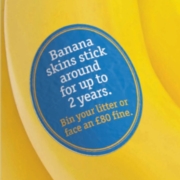Recycling and litter: Flexibility is the key to change
Our mission at Zero Waste Scotland is to help drive behaviour change, to make better use of our resources for the economy and planet. Through our process of gathering evidence to inform our interventions, we’ve discovered that sometimes very different approaches are needed. This has emerged starkly in the approaches to increasing recycling and tackling litter, which we presented at the APSE Scotland Fleet, Waste and Grounds Seminar at Aviemore in May.
While nationwide consistency is the driving force behind moves to increase recycling when tackling litter, the evidence shows a more granular approach is likely to be successful. Scotland’s national rate of recycling is currently hovering around 43 per cent. We all want that to be higher to maximise the economic and practical potential of the materials, while cutting the amount we send to landfill and saving energy, water and other finite, valuable resources.
Achieving greater consistency within recycling collections across Scottish council areas will, we believe, help improve the participation from citizens in our services. We know it will help remove confusion around the different systems in different local authority areas, where households currently have several different bins that vary from area to area in colour, size, type, and what you should put in them.
Making recycling easier is one of the main drivers behind the Household Recycling Charter and Code of Practice, launched last year. But so too is the economic benefits of having more consistent services. By moving towards a consistent set of materials, we also expect trading conditions to be more favourable. Investing in high performing kerbside recycling, where sorting of materials is limited to higher quality streams, makes it more likely that we can keep and create jobs in Scotland. We have the best chance of creating employment at the point of collection, when the material is within the control of councils.
Alongside other policy measures and work being done to drive up quality and broker materials into the market, the Recycling Charter will help channel our valuable resources and provide the key to unlocking their value on a national scale. Things are already moving fast. We were delighted to welcome Falkirk as the first Charter signatory earlier this year and we’ve seen strong interest from a further group of local authorities.
It’s interesting that while stimulating consumer action around recycling is all about nationwide consistency, the picture is different when it comes to tackling litter. Here, the evidence shows targeted action at a micro-level, and tailoring messages to specific environments – from beaches and parks, to leisure centres and pubs – could be more effective than a one-size-fits-all approach. As the delivery body for the Scottish Government’s litter strategy, Zero Waste Scotland is interested in what works. At APSE’s Aviemore seminar, our litter expert Cath Wilson showcased a new range of tools aimed at helping stakeholders to really get down to the micro-level in tackling litter – all part of continuing to foster a preventative approach, rather than relying on increasingly unaffordable clean-ups.
We have spent the past few years building a body of evidence to inform our approach. What the evidence shows is that context, and local and personal factors are crucial when it comes to litter. Our Rapid Evidence Review of Littering Behaviour and Anti-Litter Policies (2013) suggested that interventions, including communications, should aim to target specific instances of littering. This should take into account activities, locations, and types of litter concerned, as well as aiming messages at specific audiences, and considering the most effective channels for getting those messages across.
Our 2015 report, Public Perceptions and Concerns around Litter, built on the rapid evidence review with qualitative research to dig deeper into how people perceive litter and littering behaviour. The results showed that people care more about litter when it’s on their doorstep, in an area or situation they use regularly for leisure and recreation, and according to their understanding of the ‘story’ of why it is there.
In response to these findings, we have developed a range of free-to-use communications tools. These target specific people in specific places with a prevention message – from dog walkers on the beach, to shoppers in town centres, to sports team at leisure centres. These tools deliver messaging that should help to make people stop and think before littering as they go about their daily lives.
The materials are not complete, so they may not be perfect, but we would like you to test them and we’d welcome your feedback.
You can download the toolkit here.


.png)



.png)